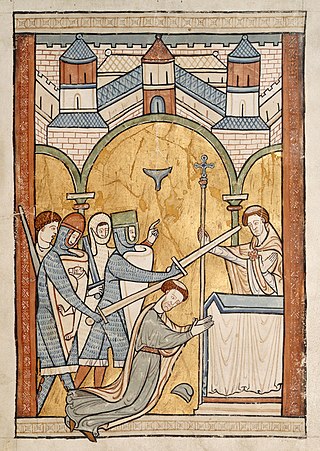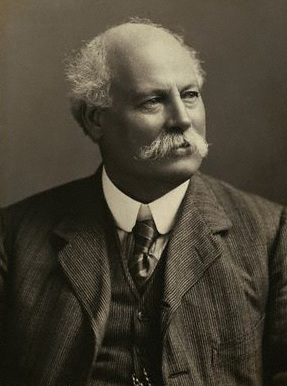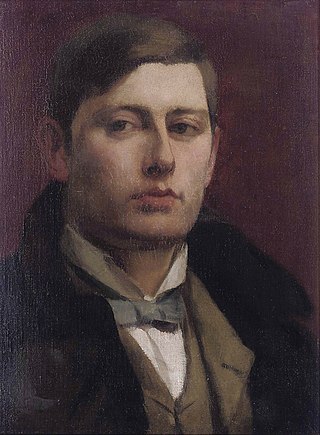
Thomas Becket, also known as Saint Thomas of Canterbury, Thomas of London and later Thomas à Becket, served as Lord Chancellor from 1155 to 1162, and then notably as Archbishop of Canterbury from 1162 until his death in 1170. He engaged in conflict with Henry II, King of England, over the rights and privileges of the Church and was murdered by followers of the King in Canterbury Cathedral. Soon after his death, he was canonised by Pope Alexander III. He is venerated as a saint and martyr by the Catholic Church and the Anglican Communion.

Canterbury Cathedral is the cathedral of the archbishop of Canterbury, the spiritual leader of the Church of England and symbolic leader of the worldwide Anglican Communion. Located in Canterbury, Kent, it is one of the oldest Christian structures in England and forms part of a World Heritage Site. Its formal title is the Cathedral and Metropolitical Church of Christ, Canterbury.

St Thomas' Hospital is a large NHS teaching hospital in Central London, England. Administratively part of the Guy's and St Thomas' NHS Foundation Trust, together with Guy's Hospital, Evelina London Children's Hospital, Royal Brompton Hospital and other sites. It is also a member of King's Health Partners, an academic health science centre, and is one of three sites used by King's College London GKT School of Medical Education.

Sir Thomas Brock was an English sculptor and medallist, notable for the creation of several large public sculptures and monuments in Britain and abroad in the late nineteenth and early twentieth centuries. His most famous work is the Victoria Memorial in front of Buckingham Palace, London. Other commissions included the redesign of the effigy of Queen Victoria on British coinage, the massive bronze equestrian statue of Edward, the Black Prince, in City Square, Leeds and the completion of the statue of Prince Albert on the Albert Memorial.

Sir George James Frampton, was a British sculptor. He was a leading member of the New Sculpture movement in his early career when he created sculptures with elements of Art Nouveau and Symbolism, often combining various materials such as marble and bronze in a single piece. While his later works were more traditional in style, Frampton had a prolific career in which he created many notable public monuments, including several statues of Queen Victoria and later, after World War I, a number of war memorials. These included the Edith Cavell Memorial in London, which, along with the Peter Pan statue in Kensington Gardens are possibly Frampton's best known works.
John Bainbridge Copnall (1928–2007) was an English artist best known for his abstract expressionist painting of richly coloured stylised realism, often on a grand scale. He was also a teacher of painting for twenty years at the Central School of Art and Design in London.
Edward Bainbridge Copnall was a British sculptor and painter. Best known for his architectural and decorative sculptures featuring allegorical and religious subjects. He was the President of the Royal Society of Sculptors from 1961 to 1966.

The Machine Gun Corps Memorial, also known as The Boy David, is a memorial to the casualties of the Machine Gun Corps in the First World War. It is located on the north side of the traffic island at Hyde Park Corner in London, near the Wellington Arch, an Equestrian statue of the Duke of Wellington, the Royal Artillery Memorial, the New Zealand War Memorial, and the Australian War Memorial.

St Nicholas Church, Chiswick is a Grade II* listed Anglican church in Church Street, Chiswick, London, near the River Thames. Old Chiswick developed as a village around the church from c. 1181. The tower was built at some time between 1416 and 1435.

Atalanta is a statue by the British sculptor Francis Derwent Wood. It shows a naked woman standing in a contrapposto position, glancing to her left, with her left hand by her side and right hand raised to her shoulder. The subject is Atalanta, a virgin huntress from Greek mythology; she may be preparing for the foot race she used as an obstacle to prevent suitors securing a marriage.
Teresa Norah Copnall, was a British painter known for her flower studies and portrait painting.









